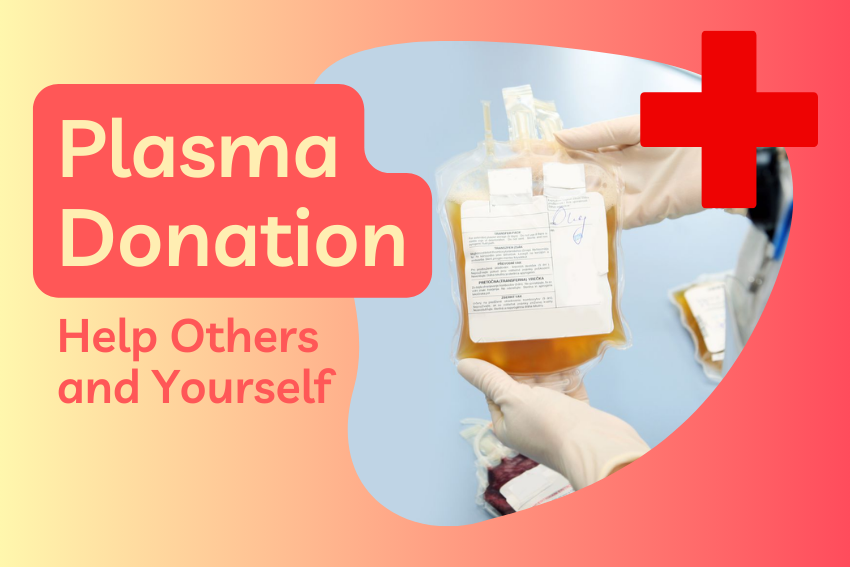Donating plasma no longer solely helps shop lives but additionally performs a key position in advancing scientific redress and research. There is an indication that it is among the most important healthcare interventions. However, several people are unaware about lifesaving benefits of plasma donation for both the recipients and donors.

This article provides insight into benefits of plasma donation – from contributing significantly to the healthcare system to personal health benefits. A full understanding of plasma donation’s significance will determine whether one should take up the donor status or not and how it would affect one’s life and other people’s lives.
The Life-Saving Benefits of Plasma Donation
Donating plasma is not only an act of life-saving donation, but a healthy, life-improving activity that one can perform. Let’s explore key benefits of plasma donation.
Save Lives
Essentially blood plasma is the most important agent in the recovery of such patients who have undergone severe burn injuries. Plasma proteins help reproduce the lost fluids, again restore arterial blood pressure, and nurture tissues – all life-governing, and all majorly taking an active role in the healing process. In addition to the fire victims, plasma is also an important constituent of treatments that are applied in liver diseases, cancer, and autoimmune diseases. Hence, it’s a major therapy commodity in non and emergencies.
When you donate plasma, you instantly affect the number of life-saving therapies manufactured for many thousands of individuals. Every donation goes to help someone who needs these treatments and ensures that the health care system can hold patients who need them.” It is where companies come into the picture by making the donation experience easy and offering benefits that give donors more value and inspire them to donate through the entire process.
You have now become part of saving lives for those who need it the most through the donation of plasma, and improved health while doing that. This donation is a vote for every patient, but it is a vote towards a better healthcare system, better healthcare lives, and hope for communities across the world.
Health Benefits for Donors
The medical benefits of plasma donation are numerous and cause their dual benefits to bear upon those receiving plasma and their donors. An extra benefit is immune enhancement. Plasma carries the immunoglobulins that serve as antibodies in helping the body fight infections. During plasma donation, others provided by the body will replenish those antibodies, thereby potentially stimulating and enhancing the entire immune response. This, in turn, would bring awareness to yet other potential pathogens for extermination, leading to much better health in the end.
Another benefit is that the donor receives a complete health check-up before every donation. This whole process ensures the donor’s safety and collects plasma of the highest quality. Blood pressure is monitored, iron levels are taken, and the general well-being of the donor is evaluated by donation centers. Donors also have their blood checked for infectious diseases like HIV and hepatitis, so donors can rest assured that what they give is safe, and ultimately that their health is in good standing. Routine health checks for plasma donation can in many instances detect any underlying issues with the donor’s health potentially even with blood circulation- thus enabling timely intervention and treatment.
Also, it is believed that the benefit of circulation may extend from donation. Proper blood circulation and cardiovascular health may be encouraged by the restoration and remaking of plasma and other components of the blood with which the body works after the donation. Regular donation could also act in regulating blood pressure by the body’s efforts to restore balance to its blood components. It is this adjustment mechanism that may, over time, help improve cardiovascular performance.
Thus, through plasma donation, you save others, and you have learned so much about yourself, making the experience rewarding in many respects.
Regular Donations Help Medical Treatment
Regular plasma donation ensures that plasma is always available in a continuous stream for ongoing medical treatments and emergencies. It cannot be artificially manufactured like most if not all medical resources. It has to be obtained from healthy donations and regular donations important to keep a steady, uninterrupted flow to those who depend on this plasma-generated therapy to live and improve their quality of life.
The wide array of conditions treated with plasma are numerous – hemophilia, deficiency in the immune system, and severe burns and liver disease, among others. Patients suffering from chronic illnesses are required to take plasma-derived products at certain intervals and times so that symptoms can be well managed, thus facilitating a normal, fulfilled life. When anyone regularly donates plasma, they constantly helps to build up the supply, making it truly available for hospitals, clinics, and research facilities so that it can be lifesaving whenever it is needed.
For emergencies, it is just as essential. When patients are put through trauma and severe burns or they undergo surgery and experience massive blood loss, plasma is given to them so that their conditions can be stabilized, fluids can be replaced, and healing can start. These scenarios usually require the immediate use of plasma, and any regular donations will build up the supply in plasma banks that will be up for such urgent life-threatening needs.
Blood and plasma have been used in various medical procedures and applications. However, their importance goes beyond mere patient care. Plasma is also a very important part of research in the medical field. New therapies for many conditions are developed around plasma by scientists who need biological material. Regular donation means you are contributing towards the current medical needs and discovering newer treatments that can eventually cure diseases that have no cure yet.
Safe and Regulated Process
Safety is the number one question for anyone thinking about plasma donation. This may be intimidating for some people, but the fear of donating blood can be mitigated by knowing that plasma donation is a very safe and controlled procedure. Strict safety protocols exist to protect donors and recipients alike. Plasma donations are performed in certified centers with immediate medical oversight, and highly trained professionals following rigorous health and safety standards.
These donation centers work alongside national health regulators, including the U.S. Food and Drug Administration (FDA) and the American Association of Blood Banks (AABB). These groups set best practices for the collection process, as well as the quality of the plasma the donors provide. These regulations ensure safe plasma donation, along with constant monitoring of the donor’s health before, during, and after the donation.
Plasma is separated using the procedure called plasmapheresis and is also closely supervised to eliminate undue discomfort or reaction. However, plasma donation takes place about once or twice every week with at least 48 hours as a gap between every visit. It has become a primary avenue for donors by being available to patients who need the product while ensuring that health and safety are never compromised in the process.
Besides these measures for safety, every donation center is equipped to deal with any medical incidents that might occur during or after donation. Donors are generally asked to stay at the center for a short time after donating, to be sure they are feeling well before they leave, and the medical staff is there to help in any case if needed. They emphasize the commitment to the safety and well-being of donors.
Get Compensation For Your Time
Most plasma donation centers offer monetary compensation in appreciation of the time and effort the individual has given. Although the primary cause of donating plasma is to save lives and help scientists with ongoing cures, this payment helps compensate them for the time commitment required within the process, serving to encourage them to donate multiplicatively.
The amount of compensation differs from donation center to donation center, as well as by region and how often you go. Generally, plasma facilities pay donors a fee that is determined entirely by the amount of plasma donated and accept donors for extra payments for more frequent donation sessions. Some facilities provide additional bonuses for donors who come back a few times within a month or satisfy specific fitness and donation criteria, for example. This is well-documented, and it is to serve that assurance so facilities maintain a constant supply of plasma which is essential for therapeutic purposes.
Incentive packages often include present cards, debit playing cards, or direct payments; many amenities additionally present promotional presents, or unique bonuses to draw new or returning donors. In addition to this, positive plasma facilities may offer incentives such as freed-up snacks or drinks during the donation process, which could help make the journey more secure.
Though compensation becomes a benefit, it is crucial to remember that donation is unselfish work. The donors go on to have a widespread effect on healthcare by contributing to existence-saving treatments, and the compensation helps to make the technique reachable for individuals who could otherwise face social or economic barriers.
Contribution To Medical Research
Plasma donations are essential for medical research — and the development of new therapies, treatments, and vaccines. Plasma includes proteins, antibodies, and clotting factors, lifesaving therapies for a range of medical issues. Essentially, plasma is the building block that scientists use to forge revolutionary medicines that in turn improve life and save it.
In several instances, the constituents of plasma play vital roles in developing vaccines and other breakthroughs in medicine. Plasma is also an important material in creating biologic drugs derived from living organisms- monoclonal antibodies, and clotting factor concentrates, among others an effort to alter certain diseases’ course. Donating plasma, therefore, is of the utmost importance for providing the essential resources to researchers for the nurturing and perfecting of these revolutionary treatments.
The restating does justice to the original bases, presenting the information in a way disconnected from the original and action both essential and original.
Community Impact And Personal Satisfaction
Donation of plasma is commissioned by the satisfaction of knowing that the efforts will directly have an impact on the lives of other people. Becoming a plasma donor makes one an associate of a bigger drive to support health care, save lives, and improve the lives of others in your community and your loved ones.
The contribution of plasma to individual patients complements public health and immediate preparedness. Plasma has become a lifeline in many medical establishments such as hospitals, trauma centers, and burn units. This is where it is utilized to stabilize individuals in critical conditions. With your donation, you ensure the availability of vital medical supplies at peak demand, such as during disasters or emergencies.
On a more personal level, it also becomes a contributory factor to being involved in community service. It is a practical and tangible way to give back to not just one but millions of individuals on whose behalf such therapy is possible. It invokes that powerful sense of pride and ties with a larger whole when you know the actions you take are contributing benefits to others’ lives. It’s an opportunity to engage in selflessness while feeling part of a larger effort to advance health and save lives.
Plasma for individual patients is one more tool in the prevention kit, alongside immediate preparedness and public health. Now, plasma is a lifeline in thousands of medical establishments, including hospitals, trauma centers and burn treatment centers. Here, it is used to stabilize patients who are in critical condition. Your donation helps to keep crucial medical supplies, like during peak demand during a disaster or emergency.
Quick Recovery Time
This is one undeluded thing about plasma donation is the speedy recovery time, and how quickly it returns donors to their daily routine without much disruption. You can usually take a short rest and return to most parts of your everyday life after plasma donation, though, as opposed to, say, other invasive medical procedures.
Once an individual donates plasma, their body begins to replenish the fluid it lost during donation, which usually happens in a matter of hours. Most donors are back to normal daily activities in 24–48 hours. Unlike whole blood donation, which can take longer to recover from because red blood cells take time to rebuild, plasma donors feel only minimal tiredness and have no lasting side effects.
During a donation, a donor’s red blood cells, platelets, and white blood cells are returned to their body, leaving only the plasma, so it is collected. This facilitates a quicker rebound. Plasma donation centers often advise donors to stay well-hydrated before and after donation to help replenish fluids and raise energy levels.
Another advantage is that most plasma donation centers allow a short recovery time after donation, where you can sit back and relax before you leave. Some donors may experience mild pain, light bruise, or temporary lightheadedness, but these effects are typically short-lived.
What Would be a Reason You Can’t Donate Plasma?
Plasma donation is helpful, but not everyone can donate. Some common reasons you may be ineligible:
- Health Conditions – People who have HIV, hepatitis, or chronic diseases might be ruled out.
- Medications – Certain medications, for example, blood thinners, may render donations unsafe.
- Recent Tattoos or Piercings – 4-12 months waiting.
- Low Protein or Hemoglobin – Low protein or hemoglobin levels can lead to a temporary deferral.
- Travel to Other Countries – Any travel to areas endemic with diseases like malaria may temporarily disqualify you.
Side Effects or Dangers of Plasma Donation?
Donating plasma is safe for most people, but some may experience minor side effects. Common side effects from plasma donation include:
- Dizziness or Fainting – Reflecting the loss of liquid in donors who start feeling faint. Staying successively through hydration helps keep these symptoms to a minimum level.
- Bruising or Discomfort at the Needle Site – Some donors experience minor tingling or swelling, but in recent years, this has been rare.
- Fatigue – Eating a nutritious meal afterward since it helps digest all the postman can take some of life out of you.
- Loss of Electrolytes – Plasma contains essential electrolytes, so regular donation without good nutrition can lead to trouble.
Conclusion
The disclosure made about the benefits of plasma donation is valid, as its overall benefits are numerous and have potential impact on recipients, potential donors, and society as well.
Blood plasma also has important applications, as it is used to treat diseases such as hemophilia, immune deficiencies, and certain types of cancer through the provision of clotting factors and antibodies. The plasma donation process is relatively safe and beneficial for donors, people are paid for the service and they make their contribution to the community as an act of philanthropy.
However, plasma also has some benefits for donors, including improved heart health, as well as regular checks of the donor’s body system, to detect any symptoms that may require the plasma donor’s attention. As the use of products made from plasma increases in the future, the process of plasma donation becomes central in society, helping to create a better and healthier society and possibly saving many lives on a yearly basis.
Many people may not be aware of their ability to do so much for others by donating plasma; plasma donation is very important in ensuring that such treatments are available in the market to help those in need.


